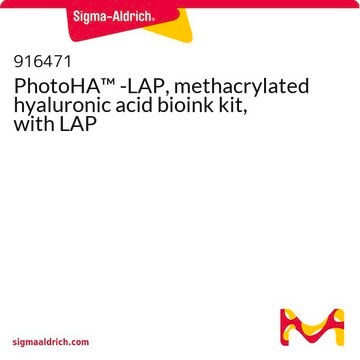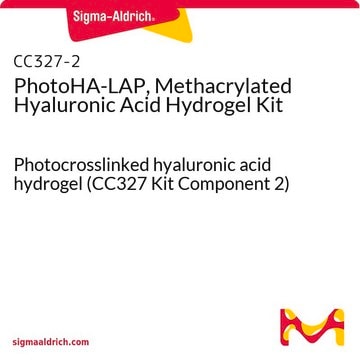추천 제품
설명
NMR: Conforms to structure
Quality Level
양식
(powder or chunk(s) or fibers)
분자량
average Mw 175000
색상
white to off-white
저장 온도
2-8°C
애플리케이션
Hyaluronic acid (HA) is a linear polysaccharide of alternating D-glucuronic acid and N-acetyl-D-glucosamine found primarily in connective tissues. HA based hydrogels are widely used in tissue engineering, 3D bioprinting, and drug deliery applications. The methacrylate functionalized hyaluronic acid is photo-crosslinkable, and can be used to generate crosslinked hydrogels.
Storage Class Code
11 - Combustible Solids
WGK
WGK 3
Flash Point (°F)
Not applicable
Flash Point (°C)
Not applicable
가장 최신 버전 중 하나를 선택하세요:
Cindy Chung et al.
Tissue engineering. Part A, 15(2), 243-254 (2009-02-06)
Mesenchymal stem cells (MSCs) are multipotent progenitor cells whose plasticity and self-renewal capacity have generated significant interest for applications in tissue engineering. The objective of this study was to investigate MSC chondrogenesis in photo-cross-linked hyaluronic acid (HA) hydrogels. Because HA
Judy Yeh et al.
Biomaterials, 27(31), 5391-5398 (2006-07-11)
Encapsulation of mammalian cells within hydrogels has great utility for a variety of applications ranging from tissue engineering to cell-based assays. In this work, we present a technique to encapsulate live cells in three-dimensional (3D) microscale hydrogels (microgels) of controlled
Bin Duan et al.
Acta biomaterialia, 9(8), 7640-7650 (2013-05-08)
Bioactive and biodegradable hydrogels that mimic the extracellular matrix and regulate valve interstitial cells (VIC) behavior are of great interest as three-dimensional (3-D) model systems for understanding mechanisms of valvular heart disease pathogenesis in vitro and the basis for regenerative
Liming Bian et al.
Proceedings of the National Academy of Sciences of the United States of America, 110(25), 10117-10122 (2013-06-05)
Methacrylated hyaluronic acid (HA) hydrogels provide a backbone polymer with which mesenchymal stem cells (MSCs) can interact through several cell surface receptors that are expressed by MSCs, including CD44 and CD168. Previous studies showed that this 3D hydrogel environment supports
Aleksander Skardal et al.
Tissue engineering. Part A, 16(8), 2675-2685 (2010-04-15)
Bioprinting by the codeposition of cells and biomaterials is constrained by the availability of printable materials. Herein we describe a novel macromonomer, a new two-step photocrosslinking strategy, and the use of a simple rapid prototyping system to print a proof-of-concept
문서
Engineered ECMs enhance immune therapy in cancer treatment by supporting cells and tissues and modulating immune response. They improve immune cell maturation, expansion, and regulation through biomaterial manipulation, acting as frameworks or carriers for enhanced tumor immunotherapy.
자사의 과학자팀은 생명 과학, 재료 과학, 화학 합성, 크로마토그래피, 분석 및 기타 많은 영역을 포함한 모든 과학 분야에 경험이 있습니다..
고객지원팀으로 연락바랍니다.







